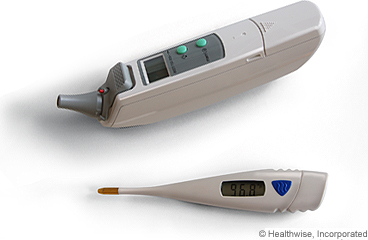
What is a fever?
A fever is a high body temperature. It's one way your body fights being sick. A fever shows that the body is responding to infection or other illnesses, both minor and severe.
A fever is a symptom, not an illness by itself. A fever can be a sign that you are ill, but most fevers are not caused by a serious problem.
You may have a fever with a minor illness, such as a cold. But sometimes a very serious infection may cause little or no fever. It is important to look at other symptoms, other conditions you have, and how you feel in general. In children, notice how they act and see what symptoms they complain of.
What is a normal body temperature?
A normal body temperature is about 98.6ºF. Some people have a normal temperature that is a little higher or a little lower than this.
Your temperature may be a little lower in the morning than it is later in the day. It may go up during hot weather or when you exercise, wear heavy clothes, or take a hot bath.
Your temperature may also be different depending on how you take it. A temperature taken in the mouth (oral) or under the arm may be a little lower than your core temperature (rectal).
What can cause a fever?
A fever may be caused by:
- Infections. This is the most common cause of a fever. Examples of infections that can cause a fever include the flu, a kidney infection, or pneumonia.
- Some medicines.
- Severe trauma or injury, such as a heart attack, stroke, heatstroke, or burns.
- Other medical conditions, such as arthritis and some cancers.
How can you treat a fever at home?
- Ask your doctor if you can take an over-the-counter pain medicine, such as acetaminophen (Tylenol), ibuprofen (Advil, Motrin), or naproxen (Aleve). Be safe with medicines. Read and follow all instructions on the label.
- To prevent dehydration, drink plenty of fluids. Choose water and other clear liquids until you feel better. If you have kidney, heart, or liver disease and have to limit fluids, talk with your doctor before you increase the amount of fluids you drink.
Follow-up care is a key part of your treatment and safety. Be sure to make and go to all appointments, and call your doctor if you are having problems. It's also a good idea to know your test results and keep a list of the medicines you take.
Where can you learn more?
Go to http://www.healthwise.net/patientEd
Enter G732 in the search box to learn more about "Learning About Fever".
Current as of: April 30, 2024
Author: Ignite Healthwise, LLC Staff
Clinical Review Board
All Healthwise education is reviewed by a team that includes physicians, nurses, advanced practitioners, registered dieticians, and other healthcare professionals.

